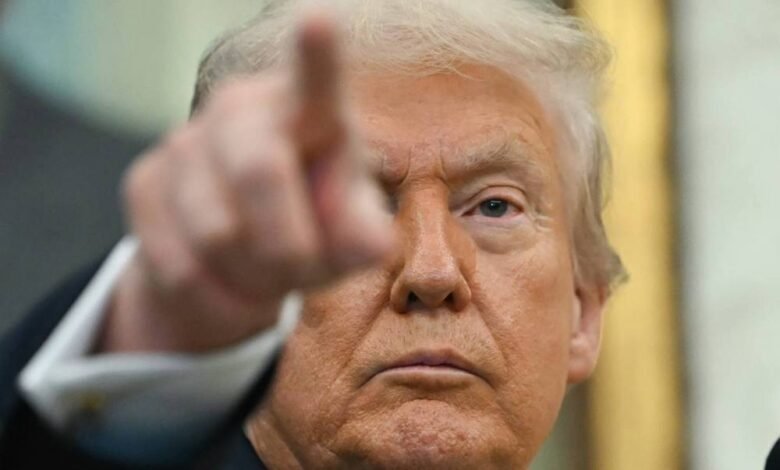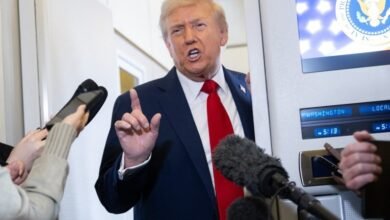The U.S. Is in a ‘Particularly Authoritarian’ Moment Under Trump

For years, many democracy experts have warned that US President Donald Trump is pushing the country toward authoritarianism. During his first term, they rang alarm bells as Trump repeatedly tested Democratic guardrails with unprecedented and, at times, inflammatory actions — especially his refusal to accept the results of the 2020 election.
When Trump was re-elected last year, many of the same experts predicted that the American political system — weakened by his first term — would face more existential challenges during his second run in the White House. Some of the country’s leading experts on democracy, fascism, and related topics even took steps to leave the country during Trump’s second term.
For years, many democracy experts have warned that US President Donald Trump is pushing the country toward authoritarianism. During his first term, they rang alarm bells as Trump repeatedly tested Democratic guardrails with unprecedented and, at times, inflammatory actions — especially his refusal to accept the results of the 2020 election.
When Trump was re-elected last year, many of the same experts predicted that the American political system — weakened by his first term — would face more existential challenges during his second run in the White House. Some of the country’s leading experts on democracy, fascism, and related topics even took steps to leave the country during Trump’s second term.
Nicholas Grossman, a professor of international relations at the University of Illinois, is among the political scientists who have raised serious concerns about Trump and his influence on the United States. Nearly nine months into Trump’s second term — and in the wake of several controversial moves by the Trump administration, including deploying National Guard troops to US cities —Foreign policy I spoke to Grossman to get his take on whether the country has moved toward authoritarianism and, if so, whether it can be stopped or reversed.
Grossman said he belongs to the “it could happen here” camp regarding the ability of authoritarianism to take hold in the United States. He said those who think “this can’t happen here” have been “always wrong, and they are clearly wrong now.”
But Grossman also emphasizes that the system is not immune to recovery, even if it is fair to say that it is already broken to some extent — and in a way that will not be easy to recover from.
Grossman said there are plenty of examples of democratic backsliding in the 21st century around the world, pointing to Hungary, Russia, India, Peru, Israel and Venezuela. He said these countries are prime examples of places where someone has come to power legally and then abused that position to dismantle checks and balances to give themselves unfair advantages.
Regimes in those places may now be described as “competitive autocracies, or some may sometimes be classified as illiberal democracies,” Grossman said, adding that political scientists also may place some in a “centrist category, and I think that’s where we’re at” in the United States.
Grossman said the Trump administration’s desire for authoritarianism “seems limitless,” but its “capacity” to achieve it remains limited. If one were to evaluate the United States solely in terms of how well it has succeeded as a constitutional democracy, Grossman said, “things are really bad.”
But it is still far from the kind of monolithic authoritarian regime one might encounter in a country like Russia, where people routinely disappear simply because they disagree with the government. Nor is the United States witnessing the kind of twentieth-century tyranny in which tens of thousands of shock troops are deployed to impose martial law and lay the foundation for a long-term political takeover or dictatorship.
“We’ve seen a lot of civil society opposition” to the Trump administration’s second agenda, Grossman said, pointing to what happened recently when he saw late-night host Jimmy Kimmel lift his show’s suspension after a public outcry as just a small example.
After Kimmel made comments on his show Jimmy Kimmel Live! Suggesting that the alleged killer of far-right activist Charlie Kirk was a Trump supporter, Trump’s FCC chairman publicly threatened action against the show’s broadcaster, ABC, and its parent company, Disney. ABC subsequently pulled Kimmel’s show from the air before eventually changing course after the comment led to public backlash. (The exact motive of Kirk’s alleged killer remains unclear, but his mother reportedly told prosecutors that his political views had recently moved to the left.)
By comparison, in President Vladimir Putin’s Russia, even satirical puppet shows have not escaped state censorship during his more than two decades in power. By that standard, Grossman said that pro-democracy and anti-authoritarian forces in the United States are “in good shape” but “certainly not great,” and he expects things will “get worse.”
Grossman said the United States is going through a “particularly authoritarian” moment as Trump is deploying or trying to deploy National Guard troops in cities across the country — generally against the will of local leaders — as part of what the president has called a “war from within.”
Grossman said the federalization of the National Guard is only supposed to happen in “exceptional circumstances,” while stressing that Trump is “lying” to justify the deployments with baseless claims of insurrection and out-of-control crimes. He said this is a “particularly authoritarian aspect” of Trump 2.0, something “classic fascist.”
Grossman said that the activities of the participating forces “are not focused on dealing with crime,” adding also that combating criminals is the task of the police, not the army. Up until this point, National Guard troops deployed to Washington have been seen performing landscaping duties.
The deployments have faced a number of legal challenges, and judges in lower courts appear not to have liked the administration’s general reasoning for the moves. For example, US District Judge Charles Breyer, based in California, said in a September ruling that Trump deployed the National Guard to Los Angeles “ostensibly to suppress insurrection and ensure enforcement of federal immigration law.” But Breyer said: “There was no mutiny.”
The courts’ refusal to side with Trump on this issue is a sign that systems of checks and balances are resilient — to some extent, at least. But the bigger question is whether the Supreme Court, which has won the administration a number of victories, will reach conclusions similar to those reached by justices like Breyer if the various legal challenges to the deployments reach that level.
“If the Supreme Court majority decided to actually defend the Constitution, that would be great,” Grossman said, while emphasizing that he was “cynical” about the possibilities of that – especially since conservative justices ruled in favor of Trump last year in a controversial landmark case over presidential immunity. Grossman said it was a “terribly un-American” decision.
Grossman also stressed that the Trump administration’s recent and controversial military strikes on boats in the Caribbean that it claims belong to “narco-terrorists” should be viewed through a similar lens to the National Guard deployment. Critics say these actions, which occurred without congressional approval, violate domestic and international law. The Trump administration has unilaterally decided to treat alleged drug traffickers as enemy combatants and use lethal force against them. Along these lines, opponents say that these strikes are in fact extrajudicial killings.
“Trump’s approach to the US military in his second term is essentially a private army whose job is to impose his personal authority and harm his domestic enemies, or foreign enemies for that matter, regardless of what any law, principle or rule says,” Grossman said.
Congress was unable to prevent Trump from continuing these strikes in the Caribbean, one of many signs that his broad interpretation of presidential power extends beyond the limits of the political system.
This is just one example of the countless ways the Trump administration is “throwing the line” and “making Americans more accommodating to all kinds of undemocratic and illegal practices,” Grossman said. [and] authoritarian matters,” stressing that he finds “it is very difficult to predict what will happen next.”
Don’t miss more hot News like this! Click here to discover the latest in Politics news!
2025-10-15 21:07:00




